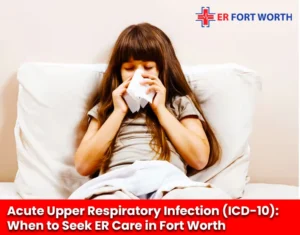Do you know a thing as simple as water works as a first-line defense against many health crises? Here’s how. hydration in emergencies, your body goes into overdrive. You’re losing fluids through vomiting, sweating, diarrhea, and fever.
All of that drains your internal water reserves. When fluid levels drop, your kidneys, heart, brain, and other organs struggle to function properly. In severe cases, it can lead to kidney failure, seizures, or even death.
In true hydration emergencies, drinking a glass of water is not enough to reverse the situation. Let’s see how ER Fort Worth stabilizes your condition with IV fluids treatment and why proper hydration matters so critically during hydration emergencies.
8 Conditions That Quickly Become Hydration Emergencies

Here are eight common issues that can turn into hydration emergencies if you don’t get fluids in time.
1. Heat Exhaustion or Heatstroke
In 2023, over 300 people in Texas lost their lives due to extreme heat.1 You see how serious Texas heat-related illnesses are. When your body overheats, you start sweating to cool down. But if you’re not replenishing those fluids, dehydration hits can lead to confusion, fainting, or organ damage.
How hydration helps in heatstroke:
- Helps the body cool down faster
- Prevents heat stroke from progressing to organ failure
- Restores blood flow to the brain and vital organs
- Reduces muscle cramps, fatigue, and confusion
2. Stomach Bugs or Food Poisoning
Have vomiting and diarrhea? You’re losing fluids by the minute. The longer it goes on, the harder it is to bounce back by drinking fluids. If you can’t keep anything down, ER hydration is necessary to keep you stable.
How hydration helps:
- Replaces critical salts like potassium and sodium
- Supports organ function, especially kidneys
- Relieves weakness, nausea, and dizziness
- Helps your body flush out toxins
3. Infections and High Fever
When you have a virus or infection, your immune system turns up the internal thermostat to fight it. That process burns energy and consumes water. If you’re not drinking enough, dehydration sets in and slows down the immune system. Bacteria and waste from infection start building and the situation gets worse.
How hydration helps in infections and high fever:
- Prevents worsening symptoms by flushing out toxins
- Enough fluid low down fever
- Helps medications (like antibiotics) circulate properly
- Maintains blood pressure and oxygen delivery
4. Injuries or Surgery
After trauma or surgery, your body needs fluids to heal. Even if the issue is minor, like after a wisdom tooth removal, fluids help you heal and prevent complications.
How hydration helps in injuries or surgery:
- It speeds up healing
- Reduces fatigue
- Keeps your body running smoothly during downtime
5. Kidney Stones
Kidney stones can worsen due to dehydration. Without enough water, minerals in urine crystalize and form stones. Dehydration also concentrates the urine, which increases pain and slows the stone’s passage.
How hydration helps:
- Increases urine flow to help pass the stone
- Reduce irritation in kidneys and bladder, which helps with pain
- Prevents further stone formation
- Keeps kidneys functioning properly while under stress
- Keep flushing bacteria and prevent kidney infection
6. Diabetic Emergencies
In diabetic emergencies like DKA (diabetic ketoacidosis), too many ketones (acids) build up in the blood and the blood becomes acidic. Less fluid in the body is unable to flush out this build up and ketones raise to dangerous levels in the blood. This eventually leads to unconsciousness and death.
How hydration helps in diabetic emergencies:
- Ease the toxic overload of ketones
- Dilutes excess glucose in the blood
- Supports kidney function under stress
- Helps insulin work more effectively
- Stabilizes vital signs like blood pressure and heart rate in DKA
- DKA makes you lose sodium, potassium, and other electrolytes. IV hydration helps bring those levels back to normal
7. Sepsis
Sepsis is a life-threatening reaction to an infection that causes inflammation throughout the body. It causes blood vessels to leak, and blood pressure can drop dangerously low, becoming a hydration emergency. Sepsis complications include dangerously low blood pressure, fast heart rate, potential organ failure, or death (if not treated on time).
How hydration helps in sepsis:
- Keep blood flowing, so organs get the sufficient oxygen
- Prevent kidneys, liver, and brain shut down
- Flush out toxins from the infection
- Delivers antibiotics more efficiently
- Stabilizes breathing and alertness
- Hydration in sepsis isn’t just helpful, it’s essential for survival
8. Urinary Tract Infections (UTIs)
UTIs are already painful and drain you. When you’re not drinking enough fluids, your body can’t flush out bacteria, and the infection can travel to your kidneys. If your body consistently lacks fluids during severe UTIs, the infection can spread and lead to sepsis.
How hydration helps in UTIs:
- Dilutes urine to flush out bacteria
- Relieves burning sensation
- Reduces risk of kidney infection
- Helps medications reach the bladder quickly
Signs You’re Dehydrated
Sometimes, drinking water at home is not enough. If you or someone else shows these signs, they may have a hydration emergency:
- Confusion or dizziness that doesn’t go away
- No urine output for 8+ hours
- Fainting
- Vomiting or diarrhea lasting more than 24 hours
- Fever with dehydration
- Dry mouth or cracked lips
- Rapid heartbeat
- Headache
Dehydration signs in kids and older adults can be even harder to catch so you need to pay extra attention.
ER Hydration Treatments at Fort Worth Emergency Room

ER hydration is about carefully balancing the fluids. When someone comes in with hydration emergencies, here’s how we handle it:
- Assessment: We immediately assess how dehydrated you are. Depending on your condition, we check blood pressure, heart rate, blood sugar levels, oxygen levels, electrolytes, and urine output.
- IV Hydration Therapy: IV hydration is the fastest way to replenish fluids. A small small plastic tube (cannula) is placed in the vein, usually in the arm or hand. IV hydration therapy directly administers fluids into the bloodstream.
- Fluid Choice: Depending on the patient’s condition, we use normal saline, lactated Ringer’s, and dextrose solutions. Medications or electrolytes are also supplemented if necessary.
- Monitor and Reassess: We keep a close eye on how you’re responding to fluids and adjust treatment as needed. Once you’re stable, we reassess your situation to decide if you can go home or need admission for more care.
Don’t Ignore Hydration Emergencies
ER hydration can save your organs, prevent shock, and keep your whole system from crashing. Please keep in mind that only drinking some more water won’t help in hydration emergencies.
Don’t risk your health and head to the nearest emergency room if you notice signs of dehydration. Fort Worth ER is open 24/7 with IV hydration to stabilize your condition. Whether it’s the Texas heat, a sudden illness, or injury, proper hydration can help you recover faster, and prevent you from bigger risks. Stay hydrated. Stay safe.
Visit Our ER For Hydration Treatment
FAQs
1. How do I know if I need ER hydration or I can manage it at home?
If you’re mildly dehydrated, drinking water or an electrolyte drink should help. But if you’re throwing up, have diarrhea, feel dizzy, haven’t peed in hours, or your symptoms aren’t improving, it’s a sign to head to Fort Worth ER. We can safely rehydrate you with IV fluids and monitor for any complications.
2. How can I prevent dehydration in emergencies?
Drink water regularly, even if not thirsty. Keep some ORS packets handy and limit physical activity in the scorching sun. If you have vomiting or diarrhea, tackle it head-on with hydration solutions like ORS or electrolyte drinks. The emergency health tips can save you from potential health risks.
3. Can dehydration be dangerous if left untreated?
Yes. Severe dehydration can lead to low blood pressure, kidney failure, seizures, or even shock. It’s especially risky for kids, older adults, and people with chronic health issues.




